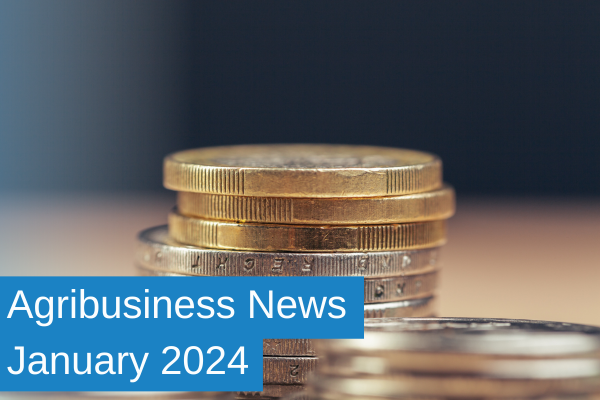Agribusiness News January 2024 – Financial Matters: Financial Update
1 January 2024Tumultuous financial year
Inflation and interest – two key terms which summarise UK finances for 2023. The economy has experienced a bumpy year however inflation rates have steeply fallen throughout from a peak of 11.1% in October 2022, largely thanks to a drop in fuel and energy.
Costs such as fuel and fertiliser have seen significant decreases in the year, however these are still a far cry from the pre-pandemic levels. The agricultural price index shows that as a whole agricultural input costs have decreased by 10%, however the value of agricultural outputs have also decreased by 5%. The key change to input costs is fertilisers which have dropped by almost 50%. The change in output sales prices is more sector dependent with biggest losers being cereals (¯26%) and milk (¯27%), while increases have been seen elsewhere like meat (8%) and potatoes (39%).
Impact of fiscal policy
With the pressures of inflation leading to a tightening of the Treasury’s belt, little has been announced in UK or Scottish budget statements to assist with Scottish agriculture this year. One of the key changes was making permanent the £1m Annual Investment Allowance. For limited companies an unlimited 100% first year allowance on Plant & Machinery, known as ‘full expensing’, has been made available which covers expenditure over this amount, but this will not be widespread in the industry. April 2023 also saw the introduction of the 25% Corporation Tax rate. For unincorporated businesses, basis period reform takes impact from the current transitional tax year of 2023/24. This impacts those with a year-end other than 31st March or 5th April as tax will now be assessed on the profits arising within the tax year, regardless of the accounting period end. For the 2023/34 tax year this will result in taxation on the normal accounting period but also the transitional period from year end to 5th April 2024. These transitional profits are subject to certain reliefs and can be spread over 5 years to ease their impact. Many businesses will be considering changing their financial year end to 31st March/5th April to ease the administrative burden going forward.
The Scottish Government 2024/25 budget outlined in December confirmed that the Starter and Basic rate bands will be increased by inflation. In addition, a new Advanced rate of 45% has been introduced for profits between £75,000 and £125,140 while the top rate of tax rises to 48%. Within agriculture, funding levels for BPS, greening and LFASS are to be maintained at current rates. Funding for agri-environment measures will decrease by 17%.
Looking forward
After 14 consecutive rises in interest rates up to August 2023, interest rates have since remained at 5.25%. This puts significant pressure on borrowing. The Bank of England governor Andrew Bailey noted that inflation rates are still too high and ruled out cuts in the short term until inflation is “squeezed” out of the system.
Inflation has now fallen below 4% for the first time since September 2021, but is not expected to reach the 2% target until the first half of 2025. The expectation is that interest rates have now peaked, but that rates are likely to settle around 4% rather than the previously predicted 3% over the coming couple of years, with cuts expected to slowly begin from summer 2024.
Andrew Coalter, andrew.coalter@sac.co.uk, 07721 473 566
The 44rd Edition of the SAC Farm Management Handbook (co-funded by the Scottish Government) is now available to download free on the Farm Advisory Service website at: https://fas.scot/publication/fmh2022
To own your own hard copy of this comprehensive and up-to-date source of farm and rural business management information, please visit www.sac.co.uk/fmh or contact us on 01835 823322 or email the FMHB team on fmh@sac.co.uk
Sign up to the FAS newsletter
Receive updates on news, events and publications from Scotland’s Farm Advisory Service

